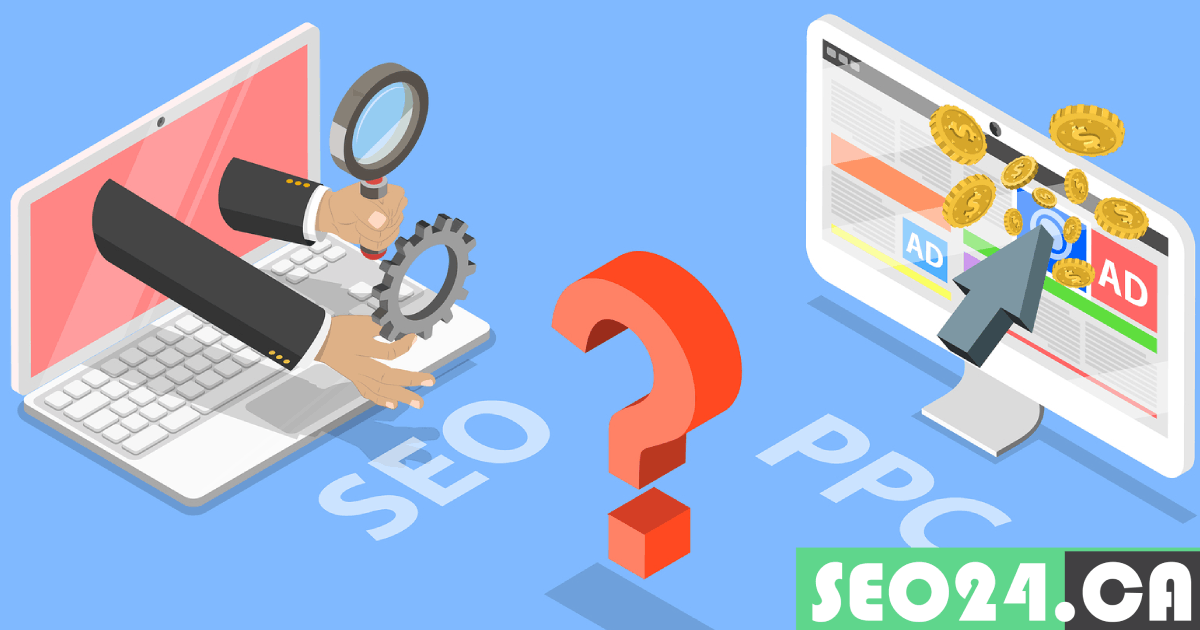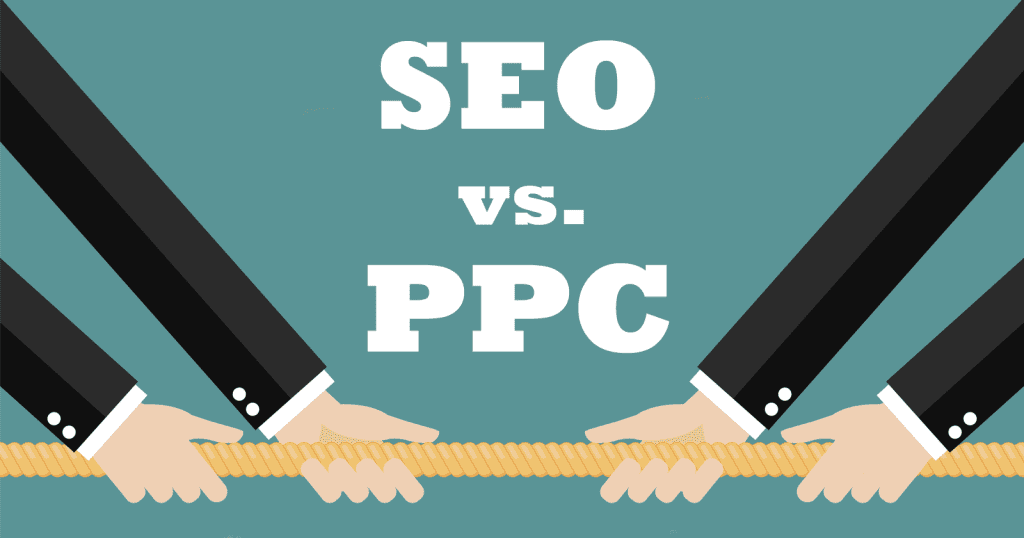
PPC vs. SEO
Choosing between Pay-Per-Click (PPC) advertising and Search Engine Optimization (SEO) is critical for businesses looking to enhance their online visibility. Both are vital components of digital marketing strategies, yet they operate differently and offer distinct advantages. This guide from SEO24 delves into the nuances of each, helping you make an informed choice about which strategy aligns best with your business goals.
Table of Contents
What is SEO, and How Does It Support Your Business?
Search Engine Optimization (SEO) is a comprehensive digital marketing strategy focused on improving a website’s visibility on search engine results pages (SERPs). By enhancing various aspects like content quality, technical structure, and backlinks, SEO helps a website rank higher for relevant keywords, attracting more organic traffic. Techniques include keyword research, on-page optimization (meta tags, headings, internal linking), and off-page strategies (backlink acquisition). SEO also addresses technical performance, such as page speed, mobile optimization, and security. The ultimate goal is to increase targeted traffic, improve user experience, and drive higher conversions.
Pros and Cons of SEO
Pros
Cost-Effective: Organic clicks are free, making SEO a long-term, budget-friendly investment.
Sustainable: With consistent effort, SEO can drive ongoing traffic without extra costs.
Credibility: Users trust organic results more, boosting brand authority.
Visibility: Higher rankings lead to better brand awareness.
User Experience: SEO improves site usability and content quality.
Cons
Time-Consuming: Significant results take months.
Ongoing Effort: Requires continual optimization to maintain rankings.
Algorithm Changes: Susceptible to search engine updates.
Complexity: Involves many evolving factors.
Competitive: Harder to rank in competitive industries.
When to Use SEO
SEO is the best choice when you’re looking to build long-term visibility and credibility for your website. It’s ideal for businesses aiming to establish an online presence organically over time, especially when targeting users at the research or awareness stage of the buyer’s journey. SEO is particularly effective for content-driven strategies, such as blog posts, guides, and tutorials, which can rank well over time and attract a steady stream of traffic without ongoing costs.
What is PPC, and How Does It Support Your Business?
Pay-Per-Click (PPC) is a digital advertising model where businesses pay a fee each time their ad is clicked. PPC ads typically appear at the top of search engine results or across platforms like Google Ads, social media, and websites. The goal is to drive immediate traffic by targeting specific keywords and demographics. Unlike SEO, which focuses on organic growth, PPC delivers instant visibility and can be scaled based on budget. Key elements include keyword bidding, ad creation, audience targeting, and performance tracking to maximize return on investment (ROI).
Pros and Cons of PPC
Pros
Immediate Results: Quick visibility for short-term goals.
Targeted Ads: Specific audience targeting by demographics and interests.
Scalable: Budget flexibility and campaign scalability.
Measurable: Detailed performance tracking and ROI.
Control: Total control over budgets, ads, and placements.
Cons
Cost: Expensive, especially for competitive keywords.
Temporary: Traffic stops once the ads are off.
Ad Blindness: Some users skip over paid ads.
Click Fraud: Risk of malicious or competitor-driven clicks.
Management: Requires ongoing optimization for best performance.
| Criteria | PPC (Pay-Per-Click) | SEO (Search Engine Optimization) |
|---|---|---|
| Cost | Costly as you pay for each click | Costs less in the long term |
| Time to Results | Immediate results | Takes time to see results |
| Duration of Impact | Short-term | Long-lasting |
| Control Over Ad | Complete control over ads | Less control, relies on search engine algorithms |
| ROI | High but expensive | High over time but may take longer |
When to Use PPC
PPC is ideal when you need immediate results and want to reach a highly targeted audience quickly. It’s perfect for time-sensitive campaigns, such as promotions, product launches, or events, where fast visibility is crucial. PPC is also beneficial when you’re entering a competitive market and want to appear at the top of search results instantly. With PPC, you control the budget, targeting options, and ad copy, making it easier to adjust campaigns based on performance.
The Basic Difference Between PPC and SEO
Understanding the fundamental differences between PPC and SEO is crucial for deciding which strategy suits your business. Here are key areas where these digital marketing strategies differ:
Cost Structure
- SEO: Involves costs related to content creation, website optimization, and sometimes external services. These are often one-time or periodic costs, with the potential for significant long-term returns as the optimized content attracts traffic.
- PPC: Requires a direct financial investment, as you pay each time someone clicks on your ad. The costs can vary widely depending on the competitiveness of the keywords you’re targeting and your industry.
Speed of Results
- SEO: A long-term strategy that builds gradually. It may take several months to see noticeable improvements in traffic and rankings, depending on the competition and the current state of your website.
- PPC: Delivers immediate visibility and can generate traffic from the moment your campaign goes live. This immediacy makes PPC ideal for short-term campaigns and quick results.
Longevity and Sustainability
- SEO: Offers sustainable benefits as the improvements to your website’s ranking can last a long time with regular updates and maintenance. It can lead to a continuous flow of organic traffic without ongoing costs.
- PPC: Provides benefits only if the campaign is active and funded. The traffic stops once you stop paying for ads, making it less sustainable in the long run compared to SEO.
Control over Results
- SEO: While you can influence rankings through optimization efforts, ultimate control lies with the search engine algorithms. They determine how content is ranked based on numerous factors, including relevance, authority, and user experience.
- PPC: Offers precise control over your campaign, including budget, targeting options, and ad creative. You can quickly adjust your strategy based on performance data, making it a highly flexible marketing tool.
Targeting Options
- SEO: Generally targets a broader audience based on search intent and keyword usage. While it can attract a diverse audience, it lacks the precision targeting capabilities of PPC.
- PPC: Allows for precise targeting, enabling you to reach particular demographics, geographic areas, and even user behaviours. This specificity can significantly enhance the effectiveness of your advertising efforts.
Trust and Credibility
- SEO: Organically ranked websites are often perceived as more credible and trustworthy. Users tend to associate high organic rankings with quality and authority.
- PPC: While practical for immediate visibility, ads are often viewed skeptically, as users know these spots are paid for. However, well-crafted ads can still build trust, especially when backed by a reputable brand.
Measurability and Metrics
- SEO: Provides a wealth of data through tools like Google Analytics, including traffic sources, user behaviour, and conversion paths. This data is invaluable for ongoing optimization and strategy refinement.
- PPC: Offers detailed analytics on ad performance, including impressions, clicks, conversion rates, and return on investment (ROI). This level of detail allows for precise campaign adjustments and budget allocation.
Best Use Cases
- SEO: Best suited for businesses looking to build a strong, lasting online presence. It’s particularly effective for content-rich websites like blogs, news sites, and online directories.
- PPC: Ideal for businesses needing quick visibility, such as e-commerce sites, event promotions, and time-sensitive offers. It’s also beneficial for targeting specific
audience with high purchase intent.

SEO vs. PPC: Which is Better for Your Business?
Choosing between SEO and PPC often depends on your business objectives, budget, and industry characteristics. Here are some scenarios to consider:
- Budget Constraints: If your budget is tight, SEO might be the better option since it focuses on long-term gains without needing continuous financial input. However, PPC can be more flexible and scalable, allowing you to start small and increase spending as needed.
- Time Sensitivity: PPC is generally the preferred option for immediate results, especially for short-term campaigns or product launches. SEO is a long-term investment, and its benefits accrue over time.
- Market Competition: SEO can be challenging and time-consuming in highly competitive markets, making PPC a viable alternative for securing immediate visibility. Conversely, in less competitive niches, SEO can yield high returns with lower costs.
Will PPC or SEO Benefit Your Business More?
Investing in PPC or SEO should align with your overall business strategy and marketing goals. Here are some considerations to help you decide:
Long-Term Growth vs. Short-Term Gains: SEO is typically better for long-term growth and building a sustainable online presence. PPC is more suited for achieving quick results, particularly in competitive markets.
Brand Positioning: If your goal is to establish your brand as an authority in your industry, SEO can help build credibility and trust over time. While effective for driving traffic, PPC may not have the same impact on brand perception.
Audience Targeting: PPC allows for precise audience targeting, which benefits businesses with specific customer segments. SEO, while broader, can attract a more comprehensive range of users based on search intent.
How to Combine SEO and PPC for Maximum ROI?
Combining SEO and PPC is a powerful strategy to boost your overall marketing success by leveraging the strengths of both channels. Here’s how you can do it in detail:
- Shared Keyword Insights: PPC provides immediate data on which keywords drive the most traffic and conversions. Use this data to optimize your SEO by targeting high-performing keywords for organic rankings. Conversely, SEO can help identify low-cost, high-traffic keywords for PPC campaigns, reducing your cost-per-click (CPC).
- Full Search Engine Coverage: By appearing in both paid and organic listings, your brand dominates search engine results pages (SERPs). This dual presence increases visibility and enhances brand credibility, as users are more likely to trust businesses that appear organically and in paid ads. Studies show that this can improve click-through rates (CTR) for both SEO and PPC efforts.
- PPC for Quick Results, SEO for Long-Term Gains: SEO takes time to build, but PPC delivers immediate results. Use PPC to drive traffic while waiting for your SEO efforts to yield organic rankings. This dual approach ensures you’re capturing traffic early on, while also investing in a long-term strategy that can reduce reliance on paid ads over time.
- Remarketing with PPC: Use PPC remarketing campaigns to re-engage users who found your site through organic search but didn’t convert. Remarketing allows you to display targeted ads to these users as they browse other websites or platforms, increasing your chances of conversion.
- A/B Testing for SEO: PPC allows for fast A/B testing of ad copy, landing pages, and call-to-action elements. Use insights from these tests to refine your SEO strategy by incorporating winning elements into your organic content, improving user engagement and conversion rates on your SEO pages.
- Cost Efficiency: While PPC can be expensive, especially for competitive industries, combining it with SEO reduces your overall cost-per-acquisition (CPA) in the long run. As your SEO efforts gain traction and drive more organic traffic, you can lower your PPC spend, using it strategically for seasonal promotions, new product launches, or highly competitive keywords where organic ranking is difficult.
- Tracking and Analytics: Use Google Analytics and PPC platforms to monitor and compare the performance of SEO and PPC campaigns. By analyzing user behavior, conversion paths, and traffic sources, you can adjust your strategies in real time for better performance. This holistic approach helps you understand the full customer journey, from first interaction to final conversion, optimizing each touchpoint.
- Targeting Different Stages of the Funnel: SEO can target users in the awareness and consideration stages by providing informative content, while PPC can focus on capturing bottom-of-the-funnel users ready to make a purchase. Tailoring content and ads to each stage of the customer journey increases your chances of converting leads into customers.
- Bid on SEO-Underperforming Keywords: If certain important keywords are hard to rank for organically due to high competition, use PPC to bid on those keywords and ensure visibility. This is particularly useful for branded terms, as it ensures your business is seen even if competitors try to outbid you in PPC or outrank you in SEO.
- Utilize Geo-Targeting and Local SEO: For businesses that rely on local customers, combining local SEO with PPC’s geo-targeting features is incredibly powerful. Optimize your website for local search terms while running targeted PPC campaigns for specific regions or zip codes, ensuring that your brand appears in front of the right audience at the right time.
How Long Does It Take to See Results from SEO and PPC?
SEO is a long-term strategy, often requiring 3 to 6 months to see noticeable improvements, depending on the competition and the effort put into optimization. It’s a marathon, not a sprint, but the results can last for years once your content ranks well. On the other hand, PPC offers instant visibility. You can start driving traffic almost immediately after launching a campaign, but the results are tied directly to your ad spend. Once you stop paying, the traffic stops, unlike SEO’s lasting impact.
Get Help From SEO Experts
Understanding the balance between PPC and SEO can be challenging, especially when trying to maximize ROI. Our experts at seo24.ca are here to help you make data-driven decisions. Contact us today for a custom strategy that aligns with your goals, whether it’s focusing on organic growth, paid advertising, or a combination of both all right here without leaving this page!
Need PPC Management Services in Toronto?
Sum Up
SEO and PPC each offer unique benefits and can be valuable in a digital marketing strategy. SEO builds long-term credibility, while PPC provides quick results and precise targeting. Using both strategies together often delivers the best results.
Choosing between SEO and PPC depends on your business goals, market conditions, and resources. Evaluating these factors will help you develop a strategy that enhances online visibility and drives sustainable growth. If you’re looking for expert PPC management services in Toronto, our team can help you craft highly targeted campaigns that maximize your ROI and complement your SEO efforts.
Share With Your Network
Related Posts
Pay-per-click (PPC) management is a widely used digital advertising method that can significantly boost your business by increasing leads,…
by
In the digital marketing world, pay-per-click (PPC) advertising is one of the most effective strategies to drive traffic and…
by
When it comes to digital marketing, two terms often used interchangeably are Google Ads and PPC. While they are…
by
Pay-Per-Click (PPC) advertising has revolutionized digital marketing by offering businesses a fast and measurable way to drive traffic, generate…
by


